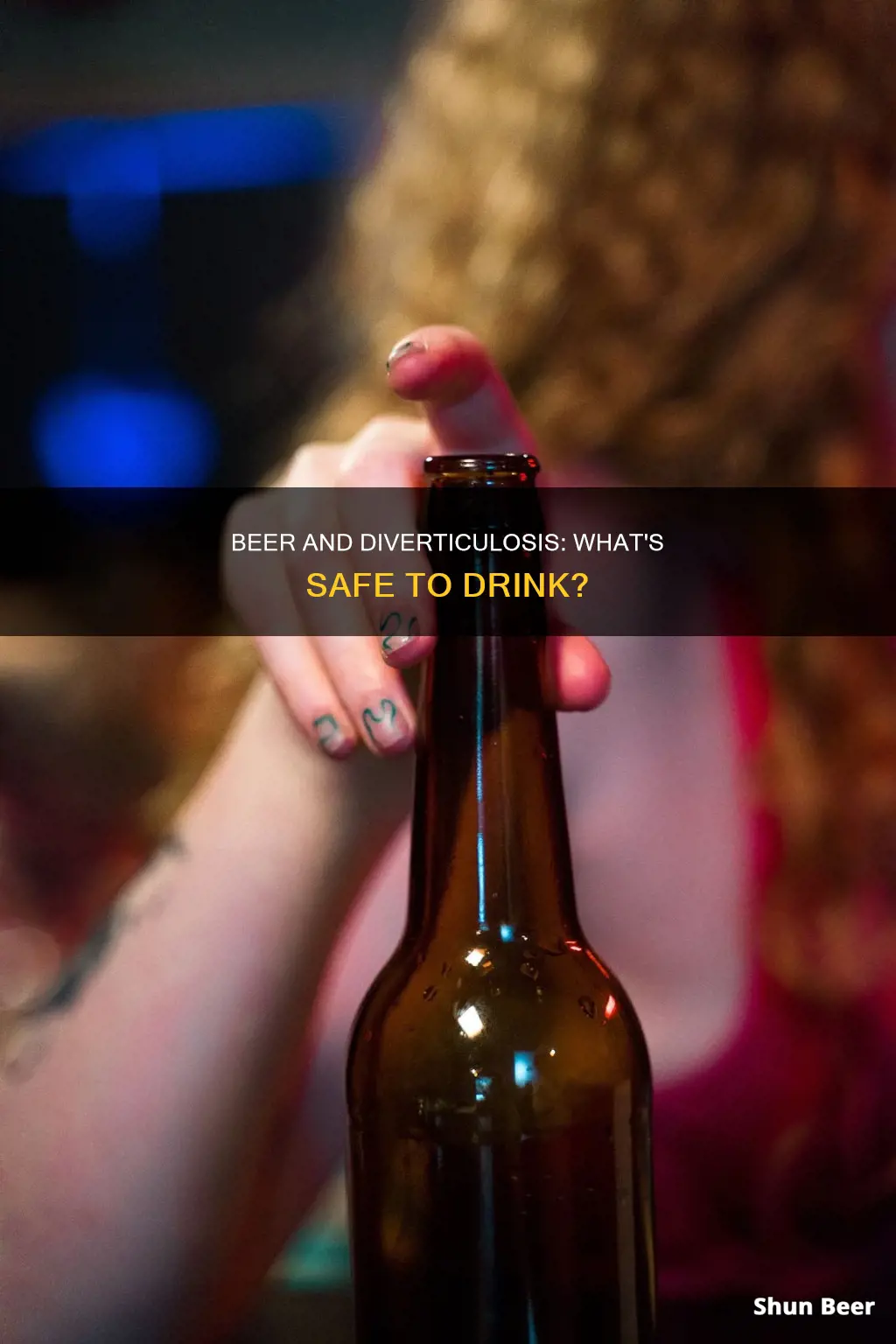
Diverticulosis is a digestive condition where small pouches called diverticula form on the intestinal tract. These pouches develop when the inner intestinal wall pushes against weak spots of the lining. While the condition is relatively harmless, it can progress into diverticulitis, which is an infection or inflammation of the intestinal pouches. This can lead to serious complications such as intestinal abscesses, scarring, and fistulas.
Alcohol consumption is a potential risk factor for diverticulosis and diverticulitis. Alcohol can cause dehydration, leading to hard stools and increased straining during bowel movements, which can contribute to the formation of diverticula. Additionally, alcohol may slow intestinal motility, resulting in constipation and increased pressure in the intestines. However, the association between alcohol consumption and diverticular disease is not fully understood, with conflicting research on the topic.
If you have diverticulosis or diverticulitis, it is generally recommended to avoid alcohol consumption. Alcohol can irritate the stomach and trigger or worsen symptoms of diverticulitis. It may also interact negatively with certain antibiotics and pain medications used to treat diverticulitis. Therefore, it is best to consult with a healthcare professional to determine if and how much alcohol can be consumed safely.
| Characteristics | Values |
|---|---|
| Should you drink beer with diverticulosis? | It depends. If you are taking antibiotics to treat diverticulitis, you most likely shouldn't. Once the infection clears, it's usually fine to drink moderate amounts of alcohol, including beer. |
| Is alcohol a cause of diverticulitis? | Research is mixed. Some studies suggest drinking alcohol is linked to a higher risk of developing diverticulosis and diverticular disease. However, a 2017 review concluded that alcohol doesn't seem to be a risk factor. |
| What causes diverticulitis? | The exact cause is not fully understood but factors that could contribute to diverticula formation include a low-fibre diet, obesity, smoking, genetics, aging, and lack of physical activity. |
| What are the symptoms of diverticulitis? | Lower abdominal tenderness, bowel irregularity (like constipation or, less commonly, diarrhoea). |
| What is the treatment for diverticulitis? | Antibiotics, a temporary low-fibre and high-fluid diet, and limitation of certain irritants like alcohol. |
What You'll Learn

Alcohol may worsen diverticulitis symptoms
There is a link between alcohol consumption and diverticulitis symptoms. Studies have shown that individuals who drink alcohol are at a higher risk of developing diverticulitis and may experience more severe symptoms. Alcohol may also slow intestinal motility, leading to constipation and increased pressure in the intestines, which can worsen diverticulitis symptoms. Additionally, alcohol can negatively interact with certain pain medications and antibiotics used to treat diverticulitis, causing side effects such as dizziness, stomach upset, and drowsiness.
If you are experiencing an active diverticulitis flare-up, it is best to avoid alcohol completely. Alcohol may irritate the stomach and trigger diverticulitis symptoms. It is generally recommended to stay away from alcohol, especially when taking antibiotics, as some antibiotics can have a nasty drug interaction with alcohol.
While the research on the link between alcohol and diverticulitis has been mixed, it is important to note that alcohol consumption may worsen symptoms for some individuals. If you are experiencing diverticulitis symptoms, it is best to consult with your healthcare provider, who can advise you on lifestyle changes, including alcohol consumption, to help manage your condition.
Beer and Cutting: Is It Possible to Enjoy Both?
You may want to see also

Alcohol may slow intestinal movement
Alcohol can interfere with the activity of the muscles surrounding the stomach and the small intestine, altering the transit time of food through these organs. In the small intestine, alcohol decreases the muscle movements that help retain food for digestion. This may contribute to the increased sensitivity to foods with a high sugar content, shortened transit time, and diarrhoea frequently observed in alcoholics.
In the large intestine, alcohol reduces the frequency and strength of the muscle contractions. These effects could reduce the transit time and compaction of intestinal contents, contributing to diarrhoea.
In the human jejunum, the alcohol concentration can drop from 10% to just 1.45% over a distance of only 30 centimetres. Therefore, alcohol's effects on nutrient absorption may vary throughout the small intestine.
Alcohol can also cause constipation because it is a diuretic. This effect can lead to dehydration because a person is urinating more often but not taking in enough fluids. If a person experiences dehydration, their large intestine will take as much water as possible from waste before it leaves the body. This reabsorption can cause a hard, dry stool that is difficult to pass.
Beer and C-Sections: What's Safe to Drink?
You may want to see also

Alcohol may increase the risk of developing diverticulosis
Alcohol can impair the movement of food as it passes through the intestine and decrease motility in the lower intestine (rectosigmoid), which has been associated with the development of diverticulosis. Alcohol consumption can also cause dehydration, leading to hard stools and increased straining during bowel movements, which may increase the risk of diverticula formation. Additionally, alcohol may slow intestinal motility, resulting in constipation and increased pressure in the intestines.
Several studies have found a significantly increased risk of diverticulosis among individuals who consume alcohol regularly. However, the association between alcohol consumption and diverticulosis is not fully understood, and further research is needed to establish a clear link. It is important to note that other factors, such as age, obesity, diet, and genetics, also play a role in the development of diverticulosis.
Beer and Steroids: A Dangerous Mix?
You may want to see also

Alcohol may increase the risk of flare-ups
Drinking alcohol while taking certain antibiotics used to treat diverticulitis can also cause nasty drug interactions. Flagyl (metronidazole) is one such antibiotic that can have adverse effects when mixed with alcohol. It is also important to note that alcohol intoxication is a potential risk factor for diverticulitis.
If you are experiencing a diverticulitis flare-up, it is best to avoid alcohol completely. Talk to your doctor about your individual risk factors and whether you need to make any lifestyle changes to reduce your risk of developing diverticulitis.
Beer Drinking and Weight Loss: Is It Possible?
You may want to see also

Alcohol may cause gastric irritation
Alcoholic gastritis is caused by drinking too much, too often. The alcohol gradually irritates and erodes the stomach lining, triggering gastritis symptoms. The most effective way to treat alcoholic gastritis and stop the stomach aches is to limit or stop alcohol use.
Alcohol can also slow intestinal motility, leading to constipation and increased pressure in the intestines. This can cause hard stools and increased straining during bowel movements, increasing the risk of diverticular formation.
Some studies have found that older age and drinking alcohol are the most identifiable risk factors for developing diverticulosis. Lifestyle changes, including avoiding alcohol, may decrease the risk of developing diverticular disease.
Drinking Beer in Public: Pennsylvania's Laws Explained
You may want to see also
Frequently asked questions
It is not advisable to drink beer or any other alcoholic beverage if you have diverticulosis. Alcohol is believed to be a risk factor for developing diverticulitis, a complication of diverticulosis where the intestinal pouches become inflamed.
It is not recommended to drink alcohol while taking antibiotics for diverticulitis as it can cause nasty drug interactions.
Alcohol doesn't have to be completely off the menu, but it's best to limit or avoid it if you're sensitive to its effects. Alcohol can act as a toxin to the stomach and cause gastritis, injury to the pancreas, and liver damage.
Doctors recommend a course of antibiotics and a bland, low-fiber diet until the infection resolves. During this time, it's best to avoid alcohol.







